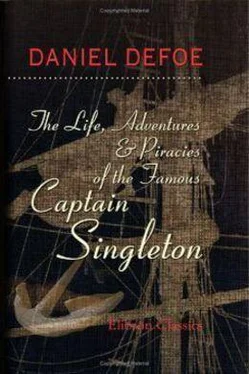On Thursday, at noon, they crossed the river Coronda [? Kannadera Oya], which parts the country of the Malabars from the king's, and on Friday, about nine or ten in the morning, came among the inhabitants, of whom they were as much afraid as of the Chiangulays before; for, though the Wanniounay, or prince of this people, payeth tribute to the Dutch out of fear, yet he is better affected to the King of Kandy, and, if he had took them, would have sent them up to their old master; but not knowing any way to escape, they kept on their journey by the river–side by day, because the woods were not to be travelled by night for thorns and wild beasts, who came down then to the river to drink. In all the Malabar country they met with only two Brahmins, who treated them very civilly; and for their money, one of them conducted them till they came into the territories of the Dutch, and out of all danger of the King of Kandy, which did not a little rejoice them; but yet they were in no small trouble how to find the way out of the woods, till a Malabar, for the lucre of a knife, conducted them to a Dutch town, where they found guides to conduct them from town to town, till they came to the fort called Aripo, where they arrived Saturday, October 18, 1679, and there thankfully adored God's wonderful providence, in thus completing their deliverance from a long captivity of nineteen years and six months.
I come now back to my own history, which grows near a conclusion, as to the travels I took in this part of the world. We were now at sea, and we stood away to the north for a while, to try if we could get a market for our spice, for we were very rich in nutmegs, but we ill knew what to do with them; we durst not go upon the English coast, or, to speak more properly, among the English factories to trade; not that we were afraid to fight any two ships they had, and, besides that, we knew that, as they had no letters of marque, or of reprisals from the government, so it was none of their business to act offensively, no, not though we were pirates. Indeed, if we had made any attempt upon them, they might have justified themselves in joining together to resist, and assisting one another to defend themselves; but to go out of their business to attack a pirate ship of almost fifty guns, as we were, it was plain that it was none of their business, and consequently it was none of our concern, so we did not trouble ourselves about it; but, on the other hand, it was none of our business to be seen among them, and to have the news of us carried from one factory to another, so that whatever design we might be upon at another time, we should be sure to be prevented and discovered. Much less had we any occasion to be seen among any of the Dutch factories upon the coast of Malabar; for, being fully laden with the spices which we had, in the sense of their trade, plundered them of, it would have told them what we were, and all that we had been doing; and they would, no doubt, have concerned themselves all manner of ways to have fallen upon us.
The only way we had for it was to stand away for Goa, and trade, if we could, for our spices, with the Portuguese factory there. Accordingly, we sailed almost thither, for we had made land two days before, and being in the latitude of Goa, were standing in fair for Margaon, on the head of Salsat, at the going up to Goa, when I called to the men at the helm to bring the ship to, and bid the pilot go away N.N.W., till we came out of sight of the shore, when William and I called a council, as we used to do upon emergencies, what course we should take to trade there and not be discovered; and we concluded at length that we would not go thither at all, but that William, with such trusty fellows only as could be depended upon, should go in the sloop to Surat, which was still farther northward, and trade there as merchants with such of the English factory as they could find to be for their turn.
To carry this with the more caution, and so as not to be suspected, we agreed to take out all her guns, and put such men into her, and no other, as would promise us not to desire or offer to go on shore, or to enter into any talk or conversation with any that might come on board; and, to finish the disguise to our mind, William documented two of our men, one a surgeon, as he himself was, and the other, a ready–witted fellow, an old sailor, that had been a pilot upon the coast of New England, and was an excellent mimic; these two William dressed up like two Quakers, and made them talk like such. The old pilot he made go captain of the sloop, and the surgeon for doctor, as he was, and himself supercargo. In this figure, and the sloop all plain, no curled work upon her (indeed she had not much before), and no guns to be seen, away he went for Surat.
I should, indeed, have observed, that we went, some days before we parted, to a small sandy island close under the shore, where there was a good cove of deep water, like a road, and out of sight of any of the factories, which are here very thick upon the coast. Here we shifted the loading of the sloop, and put into her such things only as we had a mind to dispose of there, which was indeed little but nutmegs and cloves, but chiefly the former; and from thence William and his two Quakers, with about eighteen men in the sloop, went away to Surat, and came to an anchor at a distance from the factory.
William used such caution that he found means to go on shore himself, and the doctor, as he called him, in a boat which came on board them to sell fish, rowed with only Indians of the country, which boat he afterwards hired to carry him on board again. It was not long that they were on shore, but that they found means to get acquaintance with some Englishmen, who, though they lived there, and perhaps were the company's servants at first, yet appeared then to be traders for themselves, in whatever coast business especially came in their way; and the doctor was made the first to pick acquaintance; so he recommended his friend, the supercargo, till, by degrees, the merchants were as fond of the bargain as our men were of the merchants, only that the cargo was a little too much for them.
However, this did not prove a difficulty long with them, for the next day they brought two more merchants, English also, into their bargain, and, as William could perceive by their discourse, they resolved, if they bought them, to carry them to the Gulf of Persia upon their own accounts. William took the hint, and, as he told me afterwards, concluded we might carry them there as well as they. But this was not William's present business; he had here no less than three–and–thirty ton of nuts and eighteen ton of cloves. There was a good quantity of mace among the nutmegs, but we did not stand to make much allowance. In short, they bargained, and the merchants, who would gladly have bought sloop and all, gave William directions, and two men for pilots, to go to a creek about six leagues from the factory, where they brought boats, and unloaded the whole cargo, and paid William very honestly for it; the whole parcel amounting, in money, to about thirty–five thousand pieces of eight, besides some goods of value, which William was content to take, and two large diamonds, worth about three hundred pounds sterling.
When they paid the money, William invited them on board the sloop, where they came; and the merry old Quaker diverted them exceedingly with his talk, and "thee'd" them and "thou'd" them till he made them so drunk that they could not go on shore for that night.
They would fain have known who our people were, and whence they came; but not a man in the sloop would answer them to any question they asked, but in such a manner as let them think themselves bantered and jested with. However, in discourse, William said they were able men for any cargo we could have brought them, and that they would have bought twice as much spice if we had had it. He ordered the merry captain to tell them that they had another sloop that lay at Margaon, and that had a great quantity of spice on board also; and that, if it was not sold when he went back (for that thither he was bound), he would bring her up.
Читать дальше












